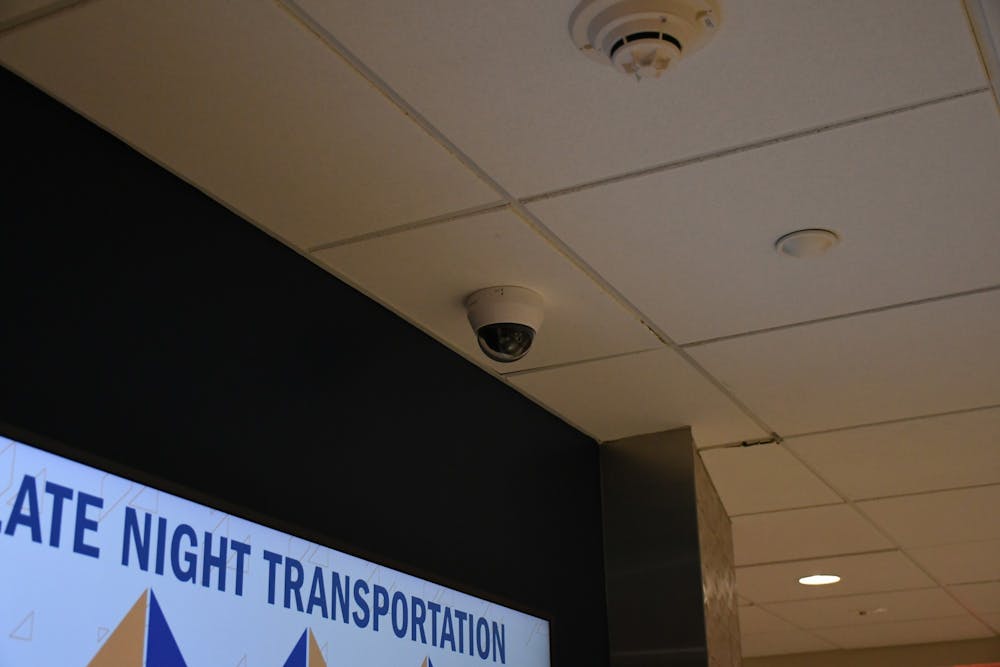Oh, to be a first-year student again — and to experience the eager excitement of the newfound independence that comes with it. I fondly look back on my earliest memories, specifically those made in my dorm. Even in the midst of the COVID-19 pandemic, I had the freedom to discover lifelong friends, share many laughs — and exam-induced tears — and even embrace the glories of communal bathrooms. This year, however, first years have had a different experience. And not because of improved COVID-19 guidelines, but because of the impromptu installation of security cameras across residence halls. The decision to install the cameras, without notifying students, does exactly the opposite of their intended purpose — they leave students questioning why the University does not value their privacy, ultimately threatening the security of all students occupying residence halls.
Housing and Residence Life’s justification for the camera installation is its report of non-resident entry and $100,000 in billable damages from the 2021-22 academic year. This large sum includes repairs to elevators, exit signs, building graphics and signage and wall damages, to name a few. And while these claims should be met with swift action, adding student surveillance should not be the University’s default solution.
While legal, I find this morally concerning. HRL states the camera locations are limited to public areas, avoiding “any field of view where an expectation of privacy exists.” This simply is not the case. One student noted cameras placed in the “hallways that lead to our bathrooms where we walk in our towels.” I have been there, with my caddy in one hand, holding up my towel with the other as I hobbled to and from the bathroom. While I describe my experience in good humor, there is no reason for adults to have video access to that.
First-year students are primarily 18 years old, some not even that. To monitor young adults and potentially minors in bathroom towels is an invasion of privacy. If these scenarios were considered by the University, they did so with little effort — failing to grasp the moral and psychological consequences of their actions.
Moreover, students were unbeknownst to this new addition to their University experience — instead notice was given to resident advisors, who were tasked with explaining it after student arrival this summer. Although HRL cites incorporating student feedback and peer review data into its proposal to install cameras, no further details were given. Ironically, its execution has been met with student concerns. This is no justification for the University’s lack of communication to first years — students deserve to know about new systems put in place that will impact their day-to-day lives. Adding video surveillance into residence halls chock-full of young-adults already anxious from being submerged in a foreign environment will only increase those anxieties further. Moreover, RAs are not the spokespersons of the University. Their job, as indicated by HRL’s website, is “to create inclusive, welcoming communities” for residents. They should not be tasked with the responsibility of explaining the poor decisions made by salary-earning leaders — and students should not have to deal with these implications either.
This is not to say that damaging property should go overlooked. But there are other, more proactive means at our disposal to mitigate this issue — like increased RA training or creating a mandatory module for students that outlines the consequences of vandalism. Placing cameras in hallways is a half-hearted attempt to protect the physical and emotional wellbeing of students in residence halls. The University is quite fond of its Honor Code, which aims to deter lying, cheating or stealing. If the University administration truly sees value in this historic aspect of University life, why not promote student accountability through the Honor Committee and their recently-amended single-sanction policy? Furthermore, The University Judiciary Committee also exists to promote safety and freedom for students. The University should utilize UJC and its use of proactive sanctions, which aim to not only educate students but prevent inappropriate behavior in the future. It is questionable to me that the University administration felt it exhausted all other options, despite Honor and UJC living right under its nose. By calling on Honor and UJC, these crimes can be addressed while also setting norms of respecting the spaces that we live and grow in for incoming first-year classes to come.
We — hopefully — all want the same thing. We want to come away with four years of meaningful experiences and connections, starting with our time in residence halls. Our first year should be filled with feelings of security and excitement, not apprehension and precaution. Surveilling students is the wrong answer to addressing this problem. It is of the utmost importance that the University administration recognize the full implications of their actions, and listen to students to make necessary changes to them. Our first year here on Grounds is at stake.
Grace Duregger is a Senior Associate Editor who writes on University life for The Cavalier Daily. She can be reached at opinion@cavalierdaily.com.
The opinions expressed in this column are not necessarily those of The Cavalier Daily. Columns represent the views of the authors alone.







